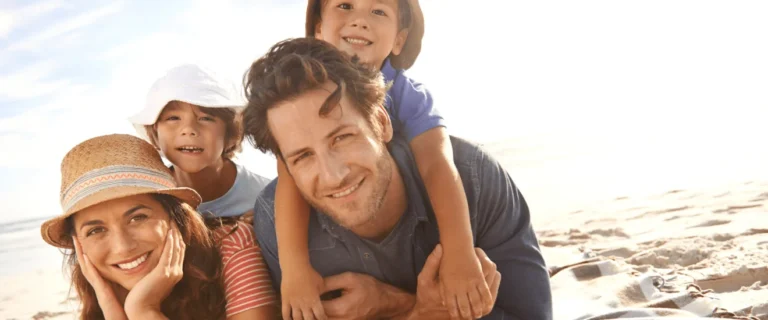Days are getting longer and the temperatures are starting to rise. Summer is right around the corner and that means it is time to start planning your child’s summer camp adventure! But is your child ready for summer camp?
When you think of summer camp you may think of older kids and teens sleeping in a cabin and spending their days swimming in a lake. But is camp the right choice for younger kids, especially those on the autism spectrum?
Although deciding whether summer camp is right for your child will depend on your child’s needs and abilities, camp can be very beneficial for toddlers and preschoolers with autism. From building social skills to improved self-esteem, summer camp can be a great option for children with ASD (autism spectrum disorder).
Keep reading to learn more about summer camps for toddlers and preschoolers with autism.
Benefits of Summer Camp for Children with Autism
While you may be on the fence about whether summer camp is the right choice for your child, it is important to remember that there are many benefits of camp for children with autism.
- New Sensory and Learning Opportunities: For young children especially, summer camp can provide an opportunity for new sensory and learning opportunities in a safe and supportive environment.
- Keeps Kids Active: Summer camp is a great way to keep your child busy and active (both physically and mentally) during the summer months.
- Improved Social Skills: Summer camps can provide a child with autism the opportunity to interact with their peers in a structured and supportive environment. Your child will likely have opportunities to work on group activities and begin to build friendships with other campers.
- Improved Self-Esteem: At summer camp your child will have the chance to try new things, make new friends, and experience a new environment. This can help build their self-esteem.
- Encourages Independence: Summer camp can provide children with the opportunity to step out of their comfort zone in a safe and supportive environment. In this safe environment, they can start exploring how to navigate new situations and new people, building their sense of independence.
Types of Summer Camps for Children with Autism
There are many different types of summer camp programs to choose from for your child with autism.
- Partial Day / Day Camps: A great option for younger or new campers, partial day or day camps provide children with a summer camp experience without the time commitment. Some camps may offer programs that run for half days while others may offer programs that run a full day similar to when a child goes to daycare or preschool. Or, some child care centers will incorporate and offer “camp-like” activities during the summer months that you can opt into.
- Traditional Summer Camps with Inclusion Programs: These types of summer camps integrate neurotypical children and children with special needs into one inclusive environment. They are designed to accommodate children of all abilities and needs and attempt to make their programs as accessible as possible. Because these camps are meant to appeal to a wide audience, they may not offer specially tailored programs or target the specific needs of your child.
- Specialized Camps: Specialized camps do just that, specialize in the specific needs of a child. There are camps specifically designed for children with autism. Other specialized camps may be more broad and specialize in working with children with all different types of special needs. These types of camps are more likely to offer programs specially designed to meet the needs of a child with autism and may focus on the common specific skill-building needs of children on the spectrum.
- Therapeutic Camps: Therapeutic camps combine therapeutic interventions with recreational activities and are designed to help campers address specific needs. These types of camps will often focus on things like skill building, behavior management, and overall well-being. They are also often staffed with a multidisciplinary team of professionals including behavior analysts, occupational therapists, speech and language therapists, and psychologists who will work together to create a personalized treatment plan for campers.
As an alternative to summer camps, you may want to consider enrolling your child in a new activity/class like tumbling, art, music, or swimming!
What to Look for When Choosing a Summer Camp
When beginning your search for the right summer camp for your child, start by making a list of all the things you want in a camp for your child. This can help you narrow down your options.
Once you have those things in mind you’ll also want to look out for things like:
- Type of Camp: There are many different types of camps to choose from today. There are more traditional outdoor camps and camps that take place at your local park in your community. Some camps are overnight, while others are only day camps or even half-day camps. Some camp programs run all summer long, others may only last a week or so, and some are weekend-long. When selecting a camp for your child make sure you choose a camp that meets the needs of your child and your family.
- Average Age of Campers: Some camps cater to a wide range of ages while others only work with a particular age group. When looking at a camp with campers of all ages, make sure that they offer activities specifically geared towards toddlers and preschoolers. Also, look into the breakdown of ages within a camp. Even if a camp is open to all ages, is a large percentage of the camp around your child’s age?
- Staff Qualifications and Training: When choosing a summer camp for your child you want to make sure you choose a program with staff that are trained to meet the needs of your child. You’ll want to find out if the staff are trained to work with kids with autism and other special needs. You’ll also want to find what type of medical staff, if any the camp has, especially if your child has any allergies or takes daily medication.
- Structure and Support: How structured are the day-to-day activities at the camp and what kind of supports do they have available to campers? Does the camp have a clear daily schedule so your child will know what to expect? Does the camp use things like visual schedules or visual supports? You want to make sure you choose a camp that is structured in a way that will accommodate your child’s needs.
- Counselor to Camper Ratio: How many campers are there to one counselor? Depending on your child’s needs, you’ll want to make sure the camp offers a lower staff-to-camper ratio, ideally 1:1 or 1:2, to ensure that your child receives the attention and support they need.
- Activities and Programs: Some camps will offer a wide array of activities while others will focus on or specialize in one or two specific areas. Research what sort of activities and programs the camp offers to make sure they match your child’s interests.
- Financial Aid: Summer camp can be expensive, but there are resources available to parents. Many camps, especially those for children with special needs often offer grants or scholarships to help pay for camp. If the camp itself does not offer financial aid you may be able to find private grants or scholarships.
How to Find Summer Camps?
Finding the right camp for your child can take some time, but there are resources all around you to help make the process easier. As you start your research:
- Talk to other parents. Other parents can be great resources for first-hand information about camps in your area. Ask other parents where they have sent their child and what their experience was like.
- Talk to your child’s care team. Your child’s care team, including their doctors and therapists, may have information on camps that would be a good fit for your child.
- Online resources. An online search can provide you with lots of information about the summer camps in your area. You can check online review platforms to read more about parents’ experiences. Online communities can be another great option to ask questions and see what other parents recommend.
The American Camp Association is a great online resource to check out. Beaming Health has compiled a list of some of the best summer camps for kids with autism throughout California!
Once you’ve settled on a camp, or your top few choices, reach out to the camp to get as much information as you can. If you can, try to take some time to visit the camp so you can tour the facility and meet the staff in person.






